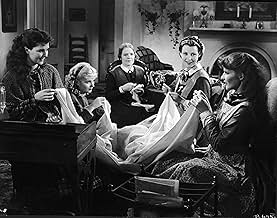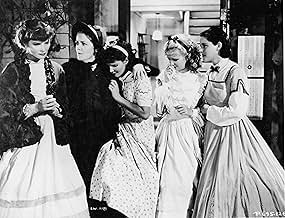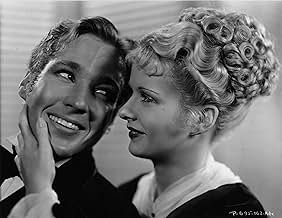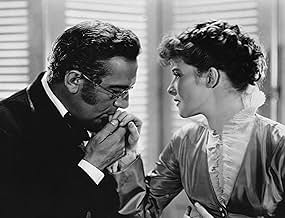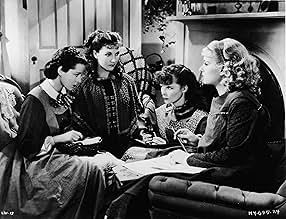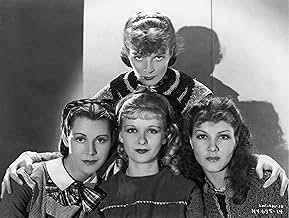IMDb RATING
7.2/10
8.3K
YOUR RATING
A chronicle of the lives of sisters growing up in 19th-century New England.A chronicle of the lives of sisters growing up in 19th-century New England.A chronicle of the lives of sisters growing up in 19th-century New England.
- Won 1 Oscar
- 7 wins & 4 nominations total
John Lodge
- Brooke
- (as John Davis Lodge)
Samuel S. Hinds
- Mr. March
- (as Samuel Hinds)
Nina Borget
- Housekeeper
- (uncredited)
Francesca Braggiotti
- Dance Teacher
- (uncredited)
Luke Cosgrave
- Old Man
- (uncredited)
Featured reviews
In fanfiction there is the phenomenon called the "Mary Sue"--a character who is an (idealized) version of the author who is inserted into the story to act out the author's fantasy. The original Mary Sue was in a Star Trek fanfiction where Ensign Mary Sue was braver than Kirk, smarter than Spock, more compassionate than McCoy, etc. who is able to save the day when nobody else can.
What has this, I hear you ask, to do with 'Little Women'? I think that all the March girls, but especially Jo, are somewhat Mary Sues to Louisa May Alcott. They are just too perfect. Especially Beth. Oscar Wilde said of Dickens' Little Nell that it would take a heart of stone not to laugh out loud reading her death scene; the same remark could apply to Beth. And Marmee is just to saintly and patient to be believed.
Still, in spite of it all, the film was worth watching, especially to see the young Kate Hepburn. I especially appreciate the time when she was asked when she would grow up and act like a proper lady, and she replied, "Never! Even when I'm old and walk with a cane!" (Or something to that effect.) Highly prophetic, as that was exactly how Kate lived.
What has this, I hear you ask, to do with 'Little Women'? I think that all the March girls, but especially Jo, are somewhat Mary Sues to Louisa May Alcott. They are just too perfect. Especially Beth. Oscar Wilde said of Dickens' Little Nell that it would take a heart of stone not to laugh out loud reading her death scene; the same remark could apply to Beth. And Marmee is just to saintly and patient to be believed.
Still, in spite of it all, the film was worth watching, especially to see the young Kate Hepburn. I especially appreciate the time when she was asked when she would grow up and act like a proper lady, and she replied, "Never! Even when I'm old and walk with a cane!" (Or something to that effect.) Highly prophetic, as that was exactly how Kate lived.
Having grown up with the Technicolor version of the 40s with a young Liz Taylor and a perky June Allyson, I was pleased to find this was just as good a version, better in many ways. Katharine Hepburn, as you might expect, is wonderful as the tomboy Jo March, who finds responsibility after a lifetime of woe for the family. Other cast stand-outs include Edna May Oliver as Aunt March. Laurie is a bit of a wet fish though. Both early versions are much, much better than the Winona Ryder one of the 90s, which was a sentimental Hollywood nostalgia trip which just didn't work. I'm still split between the two early ones but this is a definite favourite and I'd highly recommend it.
Little Women (1933)
A fairly lavish affair, with one of my favorite directors, George Cukor, making the most of his growing fame as a "woman's director." Of course, the leads here are four girls and their mother, among the children the rising star, Katherine Hepburn, in her second film (after Bill of Divorcement, also by Cukor, and a better film in many ways).
The standards here are high, the acting solid, the sets uncompromised. The plot is very goody-goody, for lack of a better word. There is a lot of family sweetness, growing young love affairs, charity to the poor, and a feeling of life being simply terrific, whatever its worries (worries like the Civil War, raging quietly in the background, never seen and rarely felt).
Cukor makes the most of Alcott's novel, I think, and Hepburn is wonderful, with all the hints of her real greatness on screen to come. The basic structure of the plot (or plots) is how each girl matures, overcoming personality flaws to become truly admirable people. It might be frustrating that human flaws are simply to be overcome, but we shouldn't resent a little optimism, and reaching higher goals, now and then. A heartfelt and really well made American drama. And I admit freely, I cried several times. That's better than any words.
A fairly lavish affair, with one of my favorite directors, George Cukor, making the most of his growing fame as a "woman's director." Of course, the leads here are four girls and their mother, among the children the rising star, Katherine Hepburn, in her second film (after Bill of Divorcement, also by Cukor, and a better film in many ways).
The standards here are high, the acting solid, the sets uncompromised. The plot is very goody-goody, for lack of a better word. There is a lot of family sweetness, growing young love affairs, charity to the poor, and a feeling of life being simply terrific, whatever its worries (worries like the Civil War, raging quietly in the background, never seen and rarely felt).
Cukor makes the most of Alcott's novel, I think, and Hepburn is wonderful, with all the hints of her real greatness on screen to come. The basic structure of the plot (or plots) is how each girl matures, overcoming personality flaws to become truly admirable people. It might be frustrating that human flaws are simply to be overcome, but we shouldn't resent a little optimism, and reaching higher goals, now and then. A heartfelt and really well made American drama. And I admit freely, I cried several times. That's better than any words.
Few would deny the powerful presence of Katherine Hepburn in any movie she ever made. In this first screen adaptation with sound of Louisa May Alcott's famous novel, Hepburn IS the movie. That is to say, her part, her lines, her camera time seem to surpass the combined times of all the rest of the cast. While that may be as one would expect for many stories – a star or hero being the focal point of a whole work, this film, based on this book, was supposed to be about several "little women." So, most of the rest of the characters in the film – save a neighbor male friend, really get short shrift. For that reason, and a few others I'll mention, I think this rendition falls short of the interesting story told in the book.
I would like to have seen more development of the sisters than this film has. The later remake – 1949's MGM production, does flesh out all the characters more. The problem with the overly heavy emphasis on the one character in this first movie is that the audience doesn't get much of a sense of who are the rest of the members of the family. So we can't so readily experience the ups and downs, the emotions, the tragedy and love felt between the sisters and their mother.
Hepburn does a very good Jo, but not great. I think her efforts to be the tomboy were overdone in a few instances, which only drew my attention to this aspect of her role. She didn't seem to come by it naturally. One example was when she spoke a couple of times, acting and deliberately mimicking a deep-throated guttural voice for a man. At other times, she seemed to push it a bit and overact in flamboyance of tom-boyish behavior.
There were no other notable performances by other cast members. Paul Lukas as Professor Bhaer and Douglas Montgomery as Laurie were good. Most of the rest were just OK or non-descript. One member was just not right for the role of Marmee. Spring Byington brought no depth or real feel to the role that the viewer could sense. But, then, the film just seemed to glide over the lesser roles.
"Little Women" is a good story in the American library, and this film is enjoyable to watch. But, for a much more involving and endearing film, be sure to see the 1949 rendition by MGM.
I would like to have seen more development of the sisters than this film has. The later remake – 1949's MGM production, does flesh out all the characters more. The problem with the overly heavy emphasis on the one character in this first movie is that the audience doesn't get much of a sense of who are the rest of the members of the family. So we can't so readily experience the ups and downs, the emotions, the tragedy and love felt between the sisters and their mother.
Hepburn does a very good Jo, but not great. I think her efforts to be the tomboy were overdone in a few instances, which only drew my attention to this aspect of her role. She didn't seem to come by it naturally. One example was when she spoke a couple of times, acting and deliberately mimicking a deep-throated guttural voice for a man. At other times, she seemed to push it a bit and overact in flamboyance of tom-boyish behavior.
There were no other notable performances by other cast members. Paul Lukas as Professor Bhaer and Douglas Montgomery as Laurie were good. Most of the rest were just OK or non-descript. One member was just not right for the role of Marmee. Spring Byington brought no depth or real feel to the role that the viewer could sense. But, then, the film just seemed to glide over the lesser roles.
"Little Women" is a good story in the American library, and this film is enjoyable to watch. But, for a much more involving and endearing film, be sure to see the 1949 rendition by MGM.
From the opening titles displaying a snow covered Curier and Ives - like print underscored by a melody played on a tinkling spinet, this 1933 version of Louisa Alcott's beloved novel holds one in thrall. A Civil War era tale of a New England family's joys and tribulations centers on the March household : mother "Marmee" and her four daughters; Meg, Amy, Beth and Jo. The screenplay centers on each girl's commitment to "showing her father proud", father being a minister gone of f to war to meet the spiritual needs of the Yankee soldiers. Buoyed by their mother [ the ever perfect Spring Byington ] the girls learn the meaning of giving and sacrifice with a jollity that may be off-putting to 21st century viewers; but stick with it, for what this picture offers is nothing less than real life at its most joyful and painful. After a series of seemingly inconsequential events, the girls' placid lives are disrupted when a sibling takes ill. This section of the movie is riveting, due to the superb direction of George Cukor and Katherine Hepburn as the tomboyish Jo. The scene where Jo retreats to the attic, worried sick over the fate of her ill sister, is gut wrenching. Hepburn was just hitting her stride as a movie actress when this film came out. Not the typical glamour girl of the time, her odd beauty and diction translated into a strange alchemy when projected on a movie screen : she is unforgettable. The other actresses acquit themselves beautifully but the picture belongs to Hepburn. Lest you think all is dour and dull, this movie offers so much that is truly entertaining : a heartwarming homecoming scene; the March girls presenting a "play" in their living room to the consternation and delight of invited neighbors and several moments involving a cantankerous but lovable aunt [ the ubiquitous Edna May Oliver ]. The movie is properly accoutered with lovely interiors and authentic production design and costumes [ gabled houses and ivy covered porches; hoop skirts and muffs ]. The entire production is like a gift wrapped edition of the novel turned to celluloid! The icing on the cake, so to speak, is Max Steiner's spare, evocative music score, employing Beth's piano playing for family get togethers, parties etc., and orchestral "commentary" for dramatic, comic and action sequences. Only six years had passed since sound recording had revolutionized the film industry, but this "early talkie" uses the new technology very adeptly; although camera movement is minimal, the editing is very fluid. The sound, courtesy of old Western Electric, is fine, especially on the recent DVD release, where both aural and visual elements have been restored, assuring a great presentation. When a movie has the power to reach out over a span of seven decades and touch jaded hearts in another century, that is a sign of a classic. LITTLE WOMEN is a great American film.
Did you know
- TriviaKatharine Hepburn asked costume designer Walter Plunkett to copy a dress her maternal grandmother wore in a tintype photograph.
- GoofsIn the Christmas play when the prop tower falls down, Jo's lips aren't moving when she says "Everything is all right."
- Quotes
Beth March: You're old enough now to leave off boyish tricks and behave better, Josephine. Now you are so tall and turn up your hair, you must remember you're a young lady.
Jo March: No, l'm not. And if turning up my hair makes me so, l'll wear it down till l'm a hundred!
- Crazy creditsPaul Lukas as Professor Bher is not listed in the closing credits.
- Alternate versionsOlder video and television prints remove the original RKO logo in the opening and replace it with the one from Selznick International.
- ConnectionsFeatured in David O. Selznick: 'Your New Producer' (1935)
- SoundtracksThe Girl I Left Behind Me
(uncredited)
Traditional
Played during the opening scene
Details
- Release date
- Country of origin
- Languages
- Also known as
- Las cuatro hermanitas
- Filming locations
- Providencia Ranch, Hollywood Hills, Los Angeles, California, USA(exterior of March house)
- Production company
- See more company credits at IMDbPro
Box office
- Budget
- $424,000 (estimated)
- Runtime1 hour 55 minutes
- Aspect ratio
- 1.37 : 1
Contribute to this page
Suggest an edit or add missing content

Top Gap
By what name was Les Quatre Filles du docteur March (1933) officially released in India in English?
Answer

